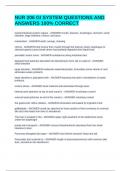NUR 206 GI SYSTEM QUESTIONS AND
ANSWERS 100% CORRECT
Gastrointestinal system organs - ANSWER-mouth, pharynx, esophagus, stomach, small
intestine, large intestine, rectum, and anus.
mastication - ANSWER-teeth, tounge, chewing
chyme - ANSWER-food moves from mouth through the pharynx down esophagus to
stomach-gastric juices break down food-partially digested semi-liquid food.
peristaltic action move - ANSWER-substances along intestinal tract
digested food particles absorbed into bloodstream from villi on walls of - ANSWER-
small intestine
large intestine - ANSWER-reabsorbs water/electrolyte, formulates some vitamin K and
eliminates waste products
large intestine is populated with - ANSWER-bacteria that aids in breakdown of waste
products.
rectum stores - ANSWER-fecal material until eliminated through anus
internal anal sphincter at top of anal canal is - ANSWER-involuntary control
external anal sphincter at end of the canal is - ANSWER-voluntary control
the gastrocolic reflex initiates - ANSWER-elimination-stimulated by ingestion food.
gallbladder - ANSWER-small sac attached to lower portion of liver-connects to common
bile duct that leads from liver to duodenum.
The liver is located in the - ANSWER-upper right quadrant of the abdominal cavity
under the diaphragm
portal vein transports - ANSWER-venous blood/nutrients absorbed from the small
intestine to liver.
Pancreas-elongated lat organ - ANSWER-sits behind stomach/ head and tail.
Pancreatic duct extends to - ANSWER-length of pancreas/connects with common bile
duct, secretions into duodenum.
, What may contribute to depressed nutritional state - ANSWER-secretion of lipase from
pancreas decreases, altering fat digestion.
Intrinsic factor - ANSWER-a special protein that helps your intestines absorb vitamin
b12
Causes of GI disorders - ANSWER-infection, inflammation, physical/chemical trauma,
surgery complications, psychological/emotional stress, genetic predisposition, immune
disorders
Causes of accessory organ disorders - ANSWER-gallbladder disease, liver disorders,
viral infections, toxins/trauma, liver cancer, pancreatitis associated with alcoholism,
peptic ulcer, hyperlipidemia, and trauma.
Prevention of gallbladder disease - ANSWER-normal weight, eat a low fat, low
cholesterol, high fiber and high calcium diet, avoid rapid weight loss diets, consume
alcohol moderately, maintain active lifestyle.
Prevention of GI disorders - ANSWER-eat a normal diet, maintain good oral health,
consume sufficient bulk, drink at least 8 glasses of fluid a day, heed the need to
defecate promptly.
Prevention of liver disorders - ANSWER-obtain immunization against hepatitis a and b,
using standard precautions when handling body fluids, particularly blood
diagnostic testing and procedure - ANSWER-radiography, ct scans, necular medicine
scans, MRI, ultrasound studies, biopsy, tests of gastric secretions, stool and urine
studies, colonoscopy, endoscopy
when someone is nauseous you should - ANSWER-avoid wearing anything with a
strong scent
Flatus (gas) - ANSWER-is formed by the action of digestive juices and bacteria on the
ingested material, resulting in bloating.
Antidiarrheal agents include - ANSWER-diphenoxylate hydrochloride (Lomotil),
loperamide hydrochloride (Imodium), tincture of opium (paregoric), or a combination
product, such as Kaopectate
bowel sounds are caused by - ANSWER-air/fluid moving through the intestinal
tract/heard as soft gurgles/clicks every 5-15 seconds.
ginger is used for - ANSWER-nausea
exercise to reduce - ANSWER-gas and bloating




